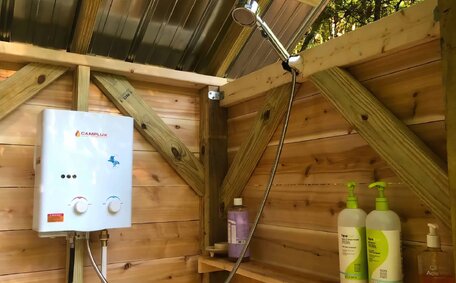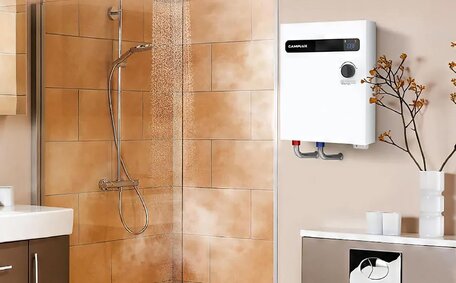Introduction to Leaking Water Heaters
Having hot water available at all times is essential in any home. A fully functional hot water tank heats and stores water until needed, providing an essential household service. Unfortunately, water heaters can develop leaks over time which disrupt this availability.
You may have noticed leaking hot water in your home, ranging from a minor drip to a significant flow. This raises the crucial question we aim to address here - is a leaking water heater an emergency?
In the following guide, we will educate you on the inner workings of a hot water system to give context for how and why leaks occur. We’ll outline potential causes, help you identify the source, and assess the risks of property damage from water leaks.
You’ll discover immediate steps to take if your electric hot water system is leaking, how to manage the leak, and when to call a professional.
Understanding your hot water heater’s functionality, spotting leaks early, and responding appropriately can prevent potential house-flooding disasters.
We’ll equip you with the knowledge to decide between basic repairs or when it’s wiser to replace the entire hot water unit.
Understanding If a Water Heater Leak is an Emergency
Determining if a water heater leak constitutes an emergency situation requires assessing the severity and location of the leak. Even minor water leaks should not be overlooked, though the urgency to respond can vary.
A significant leak from your heater can cause flooding and extensive property damage if not addressed promptly. There’s also a risk of electric shock. Such situations require immediate action: turn off water and electricity to the unit before calling a plumber.
While minor leaks may seem trivial, if left untreated, they can seriously deplete your resources. But over time, small drips can escalate, potentially causing a significant leak in your hot water system. The leak prompts a question of how much damage may lurk beneath, indicating an underlying issue needing diagnosis.
Intervene early by consulting a water heater specialist to address issues like a faulty tp valve and prevent hot water leaks causing new water system damages later.
Leaks can also pose health risks by releasing flammable gases or causing mould growth through wall saturation.
While not every leak means a drop-everything emergency, no leak should be neglected. Comprehending the leak’s type and severity is key to determining the appropriate response. If unsure, seek a professional’s evaluation to determine whether your leaking water heater requires simple fixes or a complete replacement.
Causes of Water Heater Leaks
Several issues can cause hot water irregularities, including leaks stemming from general wear and tear, faulty components, or improper maintenance.
As the unit ages and parts deteriorate, leaks may develop. Common problem areas include:
- Corroded pipes
- Cracked storage tank
- Malfunctioning pressure relief valve
- Damaged drain valve
- Leaking pipe or tank fittings
The buildup of mineral deposits from hard water can corrode metal components like your tank and pipes over time. Frost or other extreme weather may also damage exterior elements. Eventually, weakened components give way to leaks.
Internal valves play crucial roles in regulating temperature and pressure to supply hot water for all needs in your home. If these valves fail, uncontrolled water may escape through new paths. A leaking relief valve, for instance, suggests the pressure exceeds safe thresholds.
Poor installation or inadequate servicing, along with general wear, can lead to leaks, particularly in the tank. If the initial setup fails to support pipes properly or apply sufficient sealing, vibrations and water pressure within the unit will worsen the issues.
Routine inspections check for early wear on parts to prevent leaks in all hot water system types. With preventative maintenance, minor issues get addressed before they can escalate and leak your hot water heater.
Overall, the functionality of various components in a water heater can deteriorate in due course. Early problem detection and repairs can prolong your heater’s lifespan.
Many diagnosed leaks can be affordably repaired. Understanding what causes leaks in your hot water tank guides you in those replacement decisions.
Identifying the Source of a Water Heater Leak
When trying to find the origin of a water heater leak, prioritize safety by ensuring the power is turned off. Before inspection of your gas hot water unit, ensure you shut off gas valve and water supply valve connected to the unit.
Perform a thorough visual inspection of exterior components like pipes and fittings, since valves and relief valves are prone to failure.
Drips or moisture on floors signal areas that warrant close scrutiny. Leaks often stem from loose pipe joints or a leak coming from corrosion-caused holes in components.
Inconsistent hot water or only cold water supply also hints at an issue where you may need to turn to professional assistance. If some faucets yield hot water and others only cold, trace from the problematic taps back to the unit to pinpoint the leak site. Consider recent disruptions too – like a new tapping sound or vibration – which typically presage leaks.
Test all taps.
Plumbing access panels provide views of hidden connections, such as pipe fittings. Remove the cover on your water heater tank to scan all fittings and pipe joints for water droplets or lime and calcium deposits signalling small leaks. An inspection mirror aids seeing hard-to-reach spots.
Dye testing externally introduces coloured dye into the tank then requires systematic checks for traces of colour. But dye tablets dropped in the tank help confirm or rule out an inner tank leak specifically. If unsure about testing methods, it’s best to call a professional.
Overall, methodically working from the external to internal, from supply to taps, aids tracking down any leaks in a hot water system. Safety first, then676 systematic checks of all fittings, valves, pipes, and the tank provide clues to pinpoint any breach.
Risks and Damage from Leaking Water Heaters
Leaking water heaters carry risks beyond the inconvenience of lost hot water supply. Unresolved leaks lead to cumulative damage to your house, highlighting the urgent need to turn off the water source.
According to the Insurance Council of Australia, water damage accounts for 25% of household insurance claims. Costs escalate quickly with repairs for extensive flooding and moisture damage, including plumbing, restoration services, replacement of wall and floor coverings, potential electrical rewiring, and mould remediation.
Water contacting electrical aspects of the unit also risks electrocution when high water system leaking becomes critical. Leaks left unchecked weaken the structural integrity as they constantly introduce moisture, which rots the wooden framing, sneaking water your house can do without. In serious cases, the weight of pooled water can lead sections of ceilings or walls to collapse.
The severity of damage from a water leak correlates with the volume and duration of water leakage. Even small amounts of water dripping over months slowly saturate insulation and wall interiors. Seeking early expert assessment of all leaks remains key to prevent escalating repairs.
Overall, the risks posed by leaking water heaters centre less on immediate disasters and more on preventing further damage by addressing the cumulative effects of water settling and moisture accumulating in unseen locations. Getting a handle on all leaks quickly minimises health hazards, property damage, hefty insurance claims, and repair bills down the track.
Immediate Actions for a Leaking Water Heater
A leaking water heater requires prompt action, starting with turning off to reduce risks. As soon as you notice leaks, turn off main water and take precautions by following these key steps:
- Immediately turn off the power supply to eliminate any electrical hazards associated with the leak.
- Find the water mains supply valve linked to the inlet pipes and cut the heater’s water supply to halt the flow.
- Position buckets or containers under the leak to catch dripping water temporarily.
- Inspect your water heater’s top to check if the Temperature & Pressure (T&P) relief valve discharges. You can manually activate the tap lever to relieve pressure. Take care, as hot water will likely spill out.
- If the tank leaking originates from multiple sites on the unit exterior, it can be remedied by fully draining it, opening the drain valve at the base of the heater.
- If the leak is confined to the T&P valve or the top tank connectors, arrange for immediate plumbing repairs.
- If you’re unsure of the leak severity or unable to isolate/stop the flow of water yourself, give us call for professional assistance to avoid unsafe manoeuvres.
While isolating power and water supply is universally applicable, draining methods can differ by model. Refer to your user manual for specific guidance. These key actions create a stable interim situation to minimise flooding extent before permanent repairs.
Calling a Professional Plumber for a Leak
If you discover a leak in your hot water system, it is crucial to call a licenced professional plumber to assess and repair the issue. At Cranebrook Plumbing, our team of hot water specialists are available 24/7 to assist with any water heater emergency.
We understand the risks and potential damage a system leaking can pose. Our goal within your hot water system can include mitigating any flooding quickly and preventing cumulative deterioration leading to costlier repairs down the track. We aim to get all your hot water supply restored and your system integrity regained.
Upon arriving at your home, our technicians ensure all necessary systems are turned off and safety precautions are in place before diagnosing the system. We identify the affected components, isolate and stop any flowing water, and provide you with an accurate quote for repairs.
We quickly address minor repairs requiring standard part replacements. In cases of extensive corrosion or tank failures, We discuss options tailored to replace your hot water storage or gas electric water heater.
Having serviced the Cranebrook region for over a decade, we offer generous warranties to back our expert workmanship. Contact us today at 1300 349 338 or [email protected] to schedule an inspection of your leaking water heater.
Preventing Water Heater Leaks
While some leaks result from inevitable wear and tear, many occur due to lack of preventative maintenance. Regular inspections and servicing ensure continued functionality of valves and components. This significantly lowers the risk of future leaks.
Scheduling an annual inspection of your water heater by a qualified technician is recommended. They will check the anode rod protection, flush the tank, and examine all pipes and fittings for corrosion to ensure all types of hot water systems are secure. Servicing the temperature/pressure relief valve and backflow prevention devices also prevents leaks resulting from pressure buildups.
Address any issues like minor drips or new vibrations immediately when noticed. Don’t neglect minor leaks. Catching symptoms early allows affordable repairs preventing wholesale replacement later.
Proactive maintenance answers the 'what do I do’ peace of mind that your system works efficiently for its full lifespan. Consider preventative servicing plans from licenced providers like Cranebrook Plumbing to give hot water supply reliability while avoiding leak disasters.
Deciding Between Water Heater Repair or Replacement
When faced with a leaking water heater, a common dilemma is weighing up whether to repair or replace the entire unit. There are several key factors to consider when making this decision.
The age of your current hot water system plays a pivotal role. Beyond this age, the cost of multiple repairs generally outweighs replacement. Weigh up how long you have used your old unit versus the typical lifespan.
The average lifespan for hot water systems falls between 8 to 12 years. Very advanced age likely signals replacement time.
Evaluate the damage extent from leaks to guide your decision-making process.
Pinpoint whether issues stem from a singular fault like a burst valve, or point towards systematic breakdown suggesting widespread wear.
Compare the relative efficiency of your current electric model versus newer electric solar systems. Upgrading an outdated electric storage unit to a new hot water system saves substantially on energy bills and carbon emissions over time despite higher upfront costs.
For professional guidance on whether to repair or replace your heater, our experienced team is ready to assist you with the decision. Our team at Cranebrook Plumbing provides comprehensive inspections and quotes. Contact us today on 1300 349 338 to arrange an assessment.






